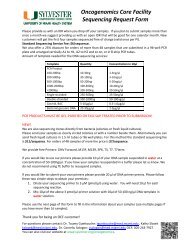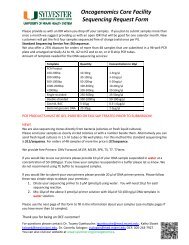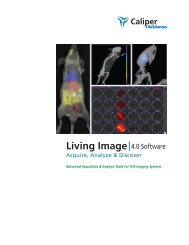SCIENTIFIC REPORT 2004 - Sylvester Comprehensive Cancer Center
SCIENTIFIC REPORT 2004 - Sylvester Comprehensive Cancer Center
SCIENTIFIC REPORT 2004 - Sylvester Comprehensive Cancer Center
Create successful ePaper yourself
Turn your PDF publications into a flip-book with our unique Google optimized e-Paper software.
T U M O R C E L L B I O L O G Y P R O G R A M<br />
long introns using the dystrophin (DMD) gene.<br />
Many cases of Duchenne muscular dystrophy<br />
are caused by splicing defects of the DMD gene<br />
transcript.<br />
The high prevalence of clinically relevant<br />
mutations that affect splicing in genetic diseases<br />
and cancer has become increasingly apparent.<br />
The aberrant splicing patterns of many genes are<br />
involved in the establishment or maintenance of<br />
the transformed phenotype or in the progression<br />
to malignancy of cancer cells. Thus, Dr. Mayeda’s<br />
research will advance the basic understanding of<br />
the regulation of pre-mRNA splicing, which will<br />
undoubtedly have a long-term impact on public<br />
human health.<br />
SELECTED PUBLICATIONS<br />
2002<br />
Hou, VC, Lersch, R, Gee, SL, Ponthier, JL, Lo,<br />
AJ, Wu, M, Turck, CW, Koury, M, Krainer, AR,<br />
Mayeda, A, and Conboy, JG. Decrease in<br />
hnRNP A/B expression during erythropoiesis<br />
mediates a pre-mRNA splicing switch. EMBO<br />
Journal 21:6195-204, 2002.<br />
2003<br />
Liu, X, Mayeda, A, Tao, M, and Zheng, Z-M.<br />
Exonic splicing enhancer-dependent selection of<br />
bovine papillomavirus type 1 nucleotide 3225 3’<br />
splice site can be rescued in a cell lacking splicing<br />
factor ASF/SF2 through activation of the<br />
phosphatidylinositol 3-kinase/Akt pathway. Journal<br />
of Virology 77:2105–15, 2003.<br />
Domsic, JK, Wang, Y, Mayeda, A, Krainer, AR,<br />
and Stoltzfus, CM. HIV-1 hnRNP A/B-dependent<br />
exonic splicing silencer ESSV antagonizes<br />
binding of U2AF65 to viral polypyrimidine<br />
tracts. Molecular and Cellular Biology 23:8762-<br />
72, 2003.<br />
Hu, D, Mayeda, A, Trembley, JH, Lahti, JM, and<br />
Kidd, VJ. CDK11 complexes promote premRNA<br />
splicing. Journal of Biological Chemistry<br />
278:8623–29, 2003.<br />
Manabe, T, Katayama, T, Sato, N, Gomi, F,<br />
Hitomi, J, Yanagida, T, Kudo, T, Honda, A,<br />
Mori, Y, Matsuzaki, S, Imaizumi, K, Mayeda, A,<br />
and Tohyama, M. Induced HMGAIa expression<br />
causes aberrant splicing of presenilin-2 premRNA<br />
in sporadic Alzheimer’s disease. Cell<br />
Death and Differentiation 10:698–708, 2003.<br />
Amada, N, Tezuka, T, Mayeda, A, Araki, K,<br />
Takei, N, Todokoro, K, and Nawa, H. A novel<br />
rat orthologue and homologue for the Drosophila<br />
crooked neck gene in neural stem cells and their<br />
immediate descendants. Journal of Biochemistry<br />
135:615–623, 2003.<br />
HIGHLIGHTS/DISCOVERIES<br />
• Demonstrated that splicing activator RNPS1 is<br />
incorporated in the early splicing complex,<br />
stimulates formation of the ATP-dependent<br />
splicing complex, and subsequently increases<br />
generation of both intermediate and final<br />
spliced products.<br />
• Discovered experimental evidence supporting a<br />
novel mechanism, termed ‘nested intron splicing’,<br />
i.e., multiple splicing of internal nested<br />
introns preceding the eventual splicing at the<br />
authentic 5’ and 3’ splice sites by using the human<br />
DMD gene.<br />
CARLOS T. MORAES, PH.D.<br />
Associate Professor of Neurology<br />
DESCRIPTION OF RESEARCH<br />
Although mitochondrial genetics of yeast and<br />
trypanosomes has been explored extensively<br />
in the last 20 years, the study of human mitochondrial<br />
DNA (mtDNA) gained momentum in<br />
1988 with the discovery of diseases associated<br />
with mtDNA mutations. The human mtDNA is<br />
a compact circular genome (16.6 kb) coding for<br />
components of the ATP-producing oxidative<br />
phosphorylation system. Because mtDNA-coded<br />
polypeptides are synthesized in mitochondrialspecific<br />
ribosomes, the mtDNA also codes for a<br />
UM/<strong>Sylvester</strong> <strong>Comprehensive</strong> <strong>Cancer</strong> <strong>Center</strong> Scientific Report <strong>2004</strong> 89
















